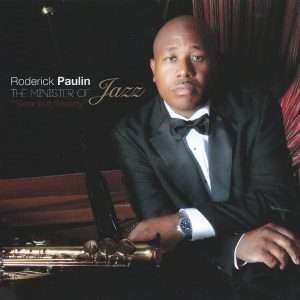When asked who’s on saxophonist Roderick Paulin’s new release, Slow But Steady, the immediate response might be “everybody.” More accurately, a ton of primarily veteran artists who make up today’s close-knit New Orleans jazz scene are represented here. Paulin, who was born into the music as the son of legendary trumpeter Ernest “Doc” Paulin, gathered together in various configurations folks who have been performing with each other for years if not decades. The total number onboard stands at over 35 musicians and, remarkably, the saxophonist has been side-by-side on stages and/or in recording studios with all of them.
At first, Slow But Steady might not sound like a particularly New Orleans album, as many cuts—like “Misty” and “In a Mellow Tone”—come from the standards’ songbook. Yet, considering the wealth of artists boasting Crescent City roots and backgrounds, the music represents their and Paulin’s true musical experiences in this city where the ability and willingness to play “it all” was a given.
The two-disc, 24-cut album starts swinging on a big band number, “Little Sheri.” For many local musicians, including Paulin, who plays with trombonist Delfeayo Marsalis’ Uptown Jazz Orchestra every Wednesday night at Snug Harbor, being a part of large ensembles has not only provided their bread and butter gigs but has enabled them to enjoy the musical camaraderie.
A tune that certainly jumps out with a New Orleans flair is Horace Silver’s “Sister Sadie.” Paulin’s got that honkin’ rhythm and blues tenor sound down and you can’t lose with David Torkanowsky behind the big Hammond B-3, George French layin’ it down on bass and Shannon Powell drivin’ the rhythm.
Paulin, who switches between tenor, soprano and alto saxophones throughout, took pen in hand to compose two stylistically different numbers. He does some of his most modern blowing on “The Other Side,” performing with a septet and trading bars with trombonist Delfeayo Marsalis and trumpeter Andrew Baham, who acted as co-executive producers of the album. Meanwhile, “Song for Paul G,” dedicated to tenor great Paul Gonsalves, finds Paulin fronting a stacked up big band with standout performances by pianist Thaddeus Richard and drummer Herlin Riley.
We learn from Paulin’s introduction that Slow But Steady took a dozen years to produce. It proves itself to be worth the time and dedication both musically and as a true historic documentation of the artists and the sound of the city. That’s what makes Slow But Steady a real New Orleans album.





